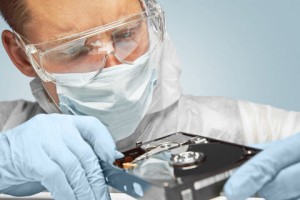 While Datarecovery.com provides services for all digital storage devices, the vast majority of the cases we receive involve solid-state drives (SSDs) or hard disk drives (HDDs).
While Datarecovery.com provides services for all digital storage devices, the vast majority of the cases we receive involve solid-state drives (SSDs) or hard disk drives (HDDs).
The prognosis for data recovery is strong for both device types, provided the work is handled by experienced engineers. However, the processes and technologies used for data recovery from SSDs and HDDs are quite different.
Below, we’ll outline some of the major differences. If you’ve lost data from an SSD, a traditional hard drive, or any other device, we’re here to help: Each of our locations is fully outfitted to provide results. With risk-free evaluations and a no data, no charge guarantee, our services give you peace of mind as your case progresses.
To get started, submit a case online or call 1-800-237-4200 to speak with an expert.
Hard Drive Data Recovery: Challenges and Techniques
A traditional hard disk drive stores data on spinning magnetic disks called platters. A set of read/write heads float just above the surface of the platters — in some cases, mere microns above the surfaces — to access data by reading magnetic charges.
Common HDD failure scenarios include:
- Mechanical Failure:. A head crash occurs when the heads come into direct contact with the magnetic platters that store your data. Head crashes must be addressed in a certified cleanroom; engineers must utilize a compatible donor drive for parts, and it’s often essential to match the model, firmware, and in some cases the manufacturing date (or a range of dates around the time of manufacture). We maintain one of the world’s largest on-site parts inventories, which allows us to match components quickly. To learn more, read: A Look Inside Datarecovery.com’s Hard Drive Parts Inventory.
- Electronic Failure: The drive’s controller can fail due to a power surge or component degradation. Recovery isn’t a simple board swap; modern PCBs contain drive-specific adaptation data that must be carefully transferred to a compatible donor board.
- Firmware Corruption: The drive’s internal operating system can become corrupted. When this happens, the drive may be recognized with the wrong capacity, or it might appear “dead” to the computer. Repairing the firmware requires specialized hardware and a comprehensive understanding of the manufacturer’s command sets.
HDD recovery is a multidisciplinary field, requiring expertise in mechanics, electronics, and firmware engineering. It also requires experience — a minor misstep anywhere in the process could cause irreversible data loss.
Each of our locations is fully equipped with cleanroom technology, and our engineers work collaboratively to find the most effective approach for each case.
Learn more about our hard drive data recovery services.
SSD Data Recovery: Challenges and Techniques
A solid-state drive (SSD) has no moving parts. It stores data on NAND flash memory chips, which are managed by a central controller. Failures are therefore entirely electronic. While SSDs don’t suffer from mechanical wear, they’re no less complex than hard drives — in many cases, SSD data recovery is a more complex process.
The challenges in SSD data recovery are unique:
- Controller Failure: As with an HDD, the controller is a common point of failure. The recovery process involves physically removing the NAND chips (chip-off recovery) and using specialized readers to extract the raw data.
- Data Reconstruction: Engineers must also reverse-engineer the controller’s complex algorithms for wear-leveling, error correction, and data placement to restore the data to a usable state.
- TRIM and Encryption: The TRIM command is used by the operating system to help the SSD manage data. While it plays a huge role in SSD operation, it can complicate data recovery efforts, particularly if the data loss scenario involves file corruption or accidental file deletion.
Once again, the prognosis for SSD data recovery is generally good — but the failure scenario matters. If you’ve lost data from an SSD, we strongly recommend seeking professional assistance as soon as possible; don’t attempt data recovery on your own.
Professional Data Recovery Solutions for Any Storage Device
At Datarecovery.com, we have invested decades of research and development to create proprietary tools for both HDD and SSD data recovery. Our risk-free evaluations allow us to determine the precise cause of failure, and every recovery attempt is backed by our no data, no charge guarantee.
If you’ve lost access to critical files, we’re here to help. Contact our experts at 1-800-237-4200 or submit a case online to begin your free evaluation.




